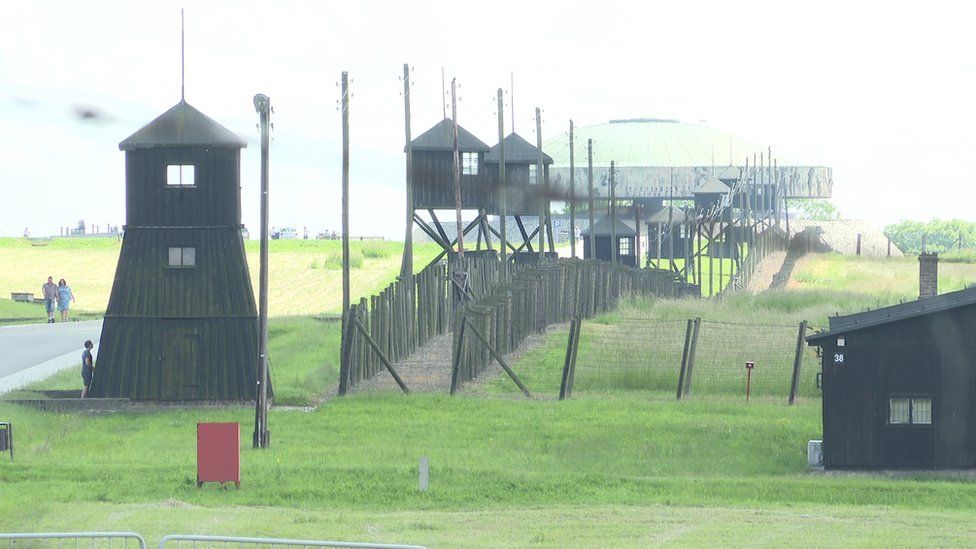Poland's painful past has lessons for Northern Ireland visitors
- Published

Learning lessons from the past and exploring shared histories has been at the centre of a peace-funded project involving people from the Armagh, Portadown and Craigavon area.
A group has recently been to Poland to find out more about the migrants now living and working in Northern Ireland.
They arrived in Lublin on Culture Night, with thousands on the streets.
It's a city that hasn't been without its difficulties.
This year marks the 30th anniversary of the June 4, 1989, elections in Poland, which ended with an extraordinary victory for the Solidarity trade union. They were first openly-contested parliamentary elections in Poland since the beginning of the communist era.
The result being the collapse of communism and the onset of political change not only in Poland, but across central and eastern Europe.
During the group's trip they went to a meeting at Lublin Town Hall. They were given an explanation of how various local communities had managed to overcome their differences.
"There were two ways to become a national hero here," says Krzysztof Stanowski, a director in the Lublin Municipal Office.
"The first way was to kill a lot of your neighbours. The second way was to be killed by your neighbours."
In the past, Mr Stanowski has been involved in peace work in Northern Ireland and other post-conflict societies around the world.
"Suddenly, around 30 years ago, we understood that this was not so promising for our children," he says.
"We don't want to be slaves to our history. We have respect for the past and for our heroes, but this is something that we tried not to offer to our children."
Visiting group member Heather Shepherd says she found what the former jailed Solidarity trade union official had to say very interesting.
"People from different parts of the world come to this part of Poland, but it is one community, and the (Lublin city) council is going back to more community development ideas; the smaller, low-key elements with the personal touch and I think we have something to learn from that."
Geoff Madill from Portadown lives among the sizeable Polish community in the town.
"It's a very big learning process for me because there are plenty of Poles in around where we are from, but nobody integrated.
"But now I would make an effort to speak to them."
On the outskirts of the city stands what's left of the Nazi German Majdanek concentration camp.
The collection of wooden huts, watch towers and barbed wire fencing was built by the Nazis to exterminate people.
Historians estimate that up to 80,000 were killed here; 60,000 of whom were Jews.
If the group was to see first-hand an example of what hatred and bigotry can lead to, then this was it.
They walked around the huts, the gas chambers and the ovens in almost total silence.
Only birdsong and the sounds of shoes crunching on the pebble paths could be heard at this scene of death, despair and cruelty on an industrial scale.
Afterwards, Norma Madill expressed how she felt about what she had seen.
"It gets to you in your stomach, I think. It gives you the creeps.
"It's as if the souls are still there in the camp. It's just harrowing."
Ann McIldoon says even though it happened more than 70 years ago, what took place in the Nazi death camps is a lesson to us all.
"I'm really amazed at what man can do to man over politics or for whatever reason. More people need to see places like this and understand the history and what actually happened.
"Seeing this really brings it home to you."
The trip to Poland completes several weeks of work around understanding other communities and ethnic groupings.
The peace money-funded project is led by Pole Maciek Bator.
"When you think about 30,000 Polish people living and working in Northern Ireland, you may think that possibly Poland is not properly developed and these people struggle at home from poverty and other issues.
"However, this trip challenges some of the stereotypes and also gives you a different perspective when you meet Polish people in Northern Ireland."
One swallow doesn't make a summer, and one visit won't answer all the questions, but there's a recognition that through sharing history, some of the lessons of the past can be learned and a new future forged.
Neill Robinson says he's glad he made the trip.
"Poland and Northern Ireland have had their troubles, but the communities have either come out of it stronger, or they've had time to pause and reflect on things and ensure that they grasp an understanding of what life is really about no matter what trouble is on their doorstep."
Mervyn Jess's report will be broadcast as part of BBC Newsline on BBC One TV at 18:30 BST on Monday, 10 June.
- Published12 March 2019
- Published28 October 2016